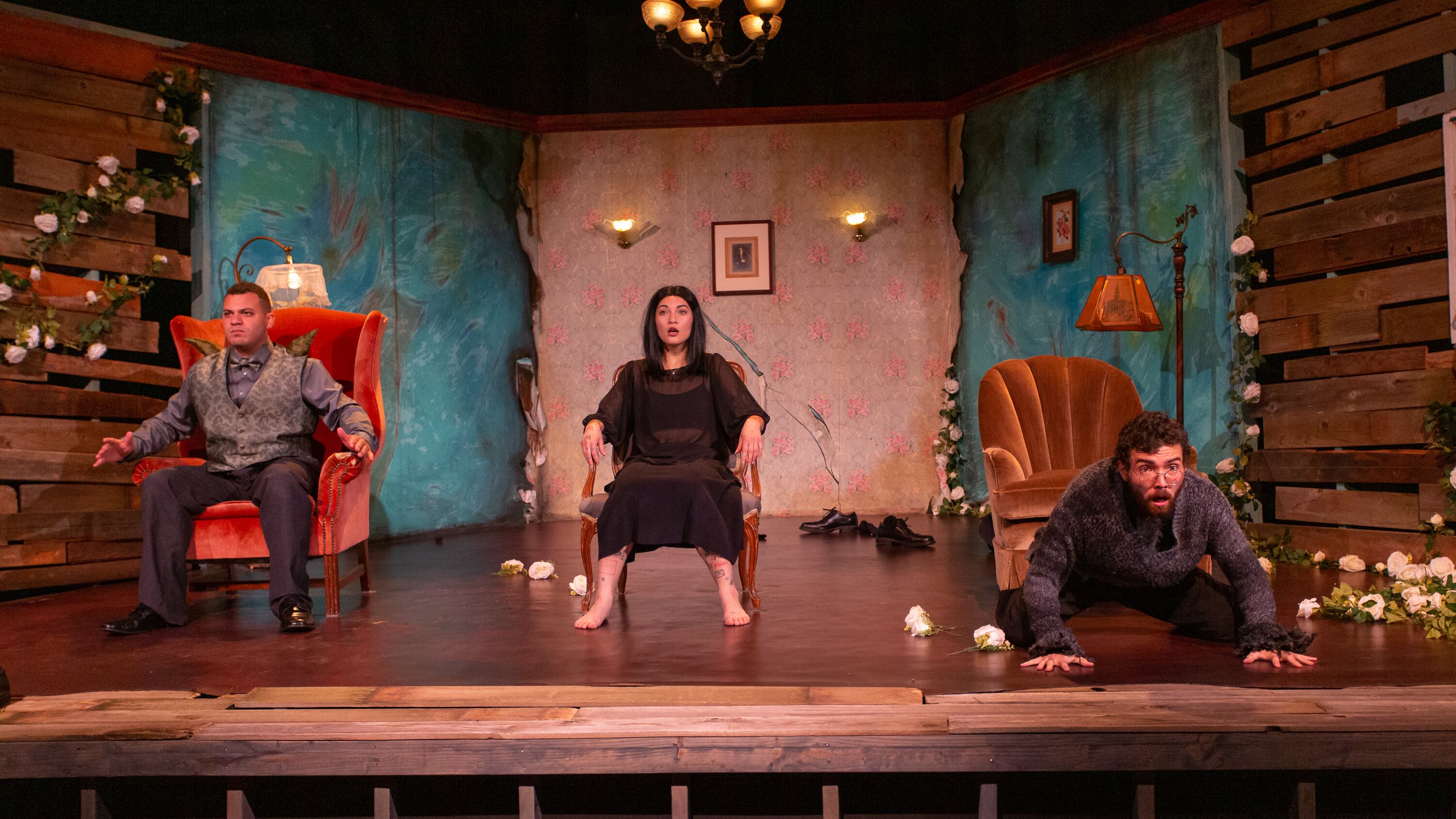Shaking the Tree Theatre’s surreal and terrifying production of Celine Song’s Family starts with three siblings staring silently into space. They are seated in a living room lovingly adorned with pale flowers, but by the story’s end, blossoms will be strewn across the stage and the quiet will be shattered by a man screaming, “Burn it down!”
Those words conclude a journey marked by gaslighting, murder and sexual violence. True to Shaking the Tree’s warning to audiences—”some patrons may find the content disturbing or upsetting”—Family bores brutal images into your soul, testing how much you can withstand before fleeing to the nearest exit.
While the urge to recoil from Family is understandable, audiences who stick with it will be rewarded with ferocious performances and a fascinating exploration of how trauma can transcend space and time. It’s a play that simultaneously dares you to look away and seizes your psyche in its metallic grip.
Family, directed by Samantha Van Der Merwe, invites you into the creepily dreamlike world of Linus (Blake Stone), David (Kai Hynes) and Alice (Rebby Yuer Foster), who have different mothers but the same father. Linus is the son of an astronaut, David is the son of an exceedingly hairy woman, and Alice is the daughter of her father’s sister—the first, but not the last, instance of incest in the play.
Linus, David and Alice are mourning the death of their father, but they bypass the five stages of grief in favor of a more peculiar and sinister journey. Rather than weep, Linus obsesses over a vile smell that is filling their house, first accusing David of farting, then identifying a crawl space as the source of the odor. In addition to a mysterious crimson light, the crawl space holds a secret that leaves all three characters questioning what they think they know about their father and shrieking in despair.
Once you learn what lurks in the crawl space, you may think you have Family figured out. You should guard against that impulse. When a play involves both a frighteningly realistic depiction of child abuse and a face on the back of a character’s head, attempting to understand what exactly is going on or even to which genre the story belongs is absurd.
By dabbling freely in domestic drama and supernatural horror, Family allows the audience to share the disorientation experienced by Linus, David and Alice. Because of the traumas of their childhood, their relationship with reality is tenuous—and by making us feel the same way, the play puts us on equal psychological footing with them.
Despite its strangeness, Family always makes sense emotionally, which is a credit to its cast. As David, an insecure loner who blogs in ancient Greek, Latin and Sanskrit, Hynes creates a portrait of potential wasted by self-doubt. His vulnerability is poignant, especially in contrast to the bombast of Stone’s Linus, who is so confident that he makes a costume with horns sticking out of the shoulders seem an utterly normal fashion statement.
While Linus and David make an intriguingly mismatched pair, Alice is the play’s protagonist and Foster is its indisputable star. Even when haunted by a disembodied voice, Alice is eerily calm, reminding us that sometimes the people who need to shout and cry the loudest are incapable of acknowledging their pain. It’s a performance that perfectly primes us for the play’s final scenes, which show Alice casually and cheerfully descending into a personal hell.
The ending is the most disturbing part of Family, but the sight of one actor sticking their tongue down another actor’s throat deserves an honorable mention. It’s an image that seems to say, “What, you thought we were going to skip that because of COVID-19? Forget about it! This is Shaking the Tree!”
Ironically, the company’s social distancing protocols for audiences are fairly stringent, but the onstage physical intimacy still sends an electric jolt through the theater. Whether it’s producing works about civil disobedience or the apocalypse, Shaking the Tree has been religiously devoted to taking risks. In Family, that devotion remains triumphantly alive.
SEE IT: Family plays at Shaking the Tree Theatre, 823 SE Grant St., 503-235-0635, shaking-the-tree.com/family.html. 7:30 pm Thursday-Saturday and 5 pm Sunday, through Nov. 6. $2-$30.
